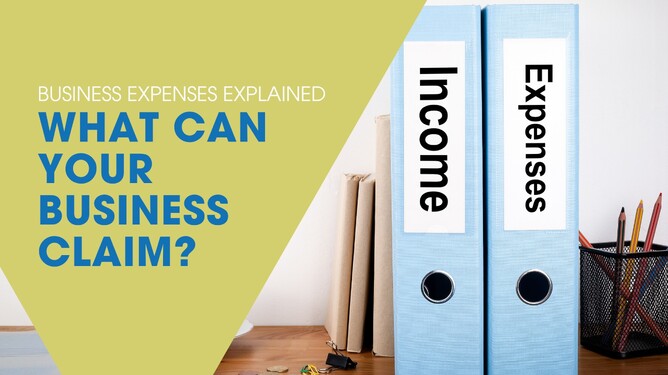Business expenses are the day-to-day costs you incur for running your business. This includes home business expenses, operating costs like internet, phone, advertising, rent, and wages, and capital and inventory costs like computers, machinery, and tools.
At the end of the financial year, New Zealand businesses need to file an income tax return. This is calculated based on your income, minus your business expenses and other deductions. Expenses go towards reducing a business’s amount of taxable income.
Hiring a tax agent or accountant to handle your tax return can actually save you money. We are experts in knowing what expenses you can claim. I can advise on the best expense management software for your businesses, helping you streamline your finances and stay on top of your costs.
What businesses need to know about expenses
The main categories for business expenses are start-up, operating costs, capital and inventory.
Start-up costs are expenses you incur when you’re starting a new business. This can include things like purchasing new equipment, licenses, permits, and marketing. Operating costs are your basics like rent, internet, phone, and wages. Capital costs are your buildings, land, or equipment, and inventory is the cost of materials, transport, or storage.
You only pay tax if your business makes a profit. Profit is the amount left over after deducting your business expenses. Your end-of-year tax is calculated based on the profit you make, minus your expenses. The more you claim the less tax you need to pay.
What can your business claim?
How much you can deduct differs depending on whether your business requires a physical structure, or you work from home.
If you run a business that requires a physical infrastructure site, such as a retail store, restaurant, manufacturing plant, hair salon, medical clinic, dentist or vet, then your expenses are fully deductible if related to your business. If you work out of your home, that’s a different story, and I discuss that in detail below.
The types of expenses you can claim as a business owner include the following:
Rent
Purchasing stock
Wages and subcontractors
Accounting fees
Marketing and advertising
Professional development
Interest loans related to your business
Insurance
Internet and telecommunications
Professional memberships
Travel costs related to business travel
50% of client gifts and food and beverage
Work vehicle expenses (calculated as a deduction per year)
Tools, stationary, and equipment
Protective clothing
Other operating expenses
Digital products such as computers, phones
Debts
Legal expenses
Bank fees
Gifts and donations
Subscription costs
Motor Vehicles
If you use a motor vehicle for work you can claim fuel, repairs, lease payments, registration, insurance, depreciation, and loan interest. But it’s worth noting, that you can only claim expenses related to business use. So, if you work from home keep a logbook of how much you use your vehicle for work.
Salaries and Wages
To claim a tax deduction on your salary or wages, you must follow PAYG withholding and report your payments. If your business is a company or trust, you can't pay yourself a wage and claim it as a deduction.
You can claim tax deductions for super contributions made for your employees and certain contractors. Super contributions for yourself aren’t deductible through your business, but you may be able to claim them in your personal tax return.
Depreciation
As assets age, they lose value. This loss of value is called depreciation. You can claim tax deductions for assets that have a limited lifespan. However, if you also use the asset for personal use (i.e. a phone) you can only claim a portion of the asset's cost.
Examples of assets that depreciate over time include:
Machinery
Motor vehicles
Furniture
Mobile phones and landlines
Computers
Working From Home
If you work from home, you can generally claim a portion of your running cost as a business expense. Expenses need to be directly related to business revenue and are calculated as a percentage of your home office usage.
There are two ways you can calculate your home office percentage. Option 1 is based on the size of your home office in relevance to the size of your home, and option 2 is based on the time you use your home as a business.
Option 1: Based on home office size
If you have an area of your home that is dedicated to the business, you can use this option to calculate the percentage you're allowed to claim.
You do this by measuring the floor area of your home (length x width = area), dividing this by the total floor area of your home and multiplying this by 100. This gives you the percentage you’re allowed to claim.
For example, if the area of your home office measures 10m2 and your home is 100m2, then 10 ÷ 100 x 100 is 10. This means you can claim 10% of your expenses.
Option 2: Based on time using your home as a business
If you work from home but don’t have a dedicated workspace (for example, you work from your kitchen table) then you can use this option to calculate your home office expenses.
This involves recording the time you spend working over a four-week period, dividing the number of hours in a week and multiplying that by 100. Then you need to calculate the area you use for home office space (like in option 1) and calculate the number of hours you use that as office space to work out how much you can claim as a running cost.
For example, let’s say you work 20 hours per week, 20 ÷ 168 (the number of hours in a week) x 100 = 12%. To work out how much to claim, convert this into a decimal, i.e., 0.12 x 0.10 = 0.012 and times by 100 to get your percentage. This means you can claim 1.2% of your business running costs.
If you’ve made it this far and feel confused — don’t worry! As a trained bookkeeper, I know exactly what you can and can’t claim, and I could potentially save you money by making sure nothing gets missed.
Got questions about business expenses or anything bookkeeping-related? Book an appointment and let’s chat!


